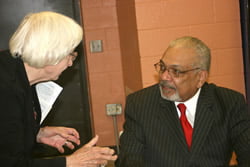
Leaven photo by Marc Anderson
Former Pentecostal minister Deacon Alex Jones visits with Most Pure Heart of Mary parishioner Kem McHugh following his talk at the church.
by Marc and Julie Anderson
Special to The Leaven
TOPEKA — What could compel a Pentecostal minister to leave his pulpit and become a Catholic?
“I wanted to be in the church of the Bible,” explained Deacon Alex Jones, now a globe-trotting Catholic apologist and permanent deacon in the Archdiocese of Detroit.
Had someone told this Detroit pastor some years back that he would leave his own congregation to become a Catholic, he wouldn’t have believed it, he said.
But from Sept. 18-20, Jones shared his journey into the Catholic Church with a crowd of 500 at Most Pure Heart of Mary Parish in Topeka.
Deacon Jones’ presentation was sponsored by the parish’s formation committee and is part of an effort to bring speakers in to help parishioners learn about and grow in their Catholic faith. Last year, the series featured well-known Catholic apologist Stephen Ray, who often appears on EWTN and who, with his wife and four children, converted to Catholicism from the Baptist tradition.
Deacon Jones said he longed for a church that reflected the Gospel of Jesus Christ.
“I wanted to be like the church of the Bible. . . . That was my dream,” he said.
He wanted to be part of the church described in the Book of Revelation, which includes people of every race and color. Although Deacon Jones said his gift was not in preaching, he loved teaching. Never did he imagine one night of teaching would set him straight on a course for the Roman Catholic Church.
In 1998, he offered his Wednesday night Bible study group a genuine experience of the early church. With the class’ enthusiasm as his motivation, Deacon Jones started reading the works of the early Fathers of the Church, including St. Ignatius of Antioch and St. Justin Martyr.
As a Protestant, he had been taught to believe the Catholic Church had introduced concepts such as transubstantiation nearly 1,000 years after Christ. What he learned from his reading surprised him.
“Saint Ignatius of Antioch, a man who was second from Peter, a man who zealously guarded the faith, a man who had received the faith directly from the apostles, was speaking about transubstantiation,” Deacon Jones said.
He quickly discovered the same in the works of St. Justin Martyr. Not only that, but he also discovered the early church had a hierarchy with bishops, priests and deacons who led the church in the celebration of the Mass.
Returning to his Bible study class and his congregation, Deacon Jones began making changes in the way his congregation worshipped, including dividing the service into two, bringing the altar out from the wall, donning vestments and even using a chalice and cruets.
“The deacons cornered me and asked me if I was becoming Catholic,” he said. “I was insulted.”
Nevertheless, he kept studying.
“The door had been opened, and I began to read and read,” Deacon Jones said, adding that eventually he could no longer ignore the call to become a Catholic.
“I wanted to be in the church that has always been,” he said. “That revelation was so powerful, I could not ignore it.”
In January 2000, Deacon Jones told his congregation he could either resign or he could spend the next six months teaching them what he had learned so far. Although many in his congregation had left, 62 members voted to journey with him in studying the Catholic Church.
And at the Easter Vigil the following year, 53 of them became members of St. Suzanne’s Catholic Church in Detroit.
One of Deacon Jones’ biggest challenges afterward was the loss of his pastorate and many of his friends. But as he began traveling the world as a Catholic deacon sharing the story of his conversion, he attracted much larger crowds than he ever had as a Protestant minister.
More importantly, though, Deacon Jones said he has been given a call to share the Gospel wherever God calls him. In doing so, he finds himself explaining concepts such as the Catholic Church’s teachings on apostolic tradition, the Blessed Sacrament, Mary as the mother of God, and the new evangelization.
For parishioner Julane Hovorka, Deacon Jones’ presentation helped her to see the importance of understanding the church’s teachings and being able to explain the teachings to others.
“I learned how important it is for us to being ready to evangelize,” said Hovorka, “not necessarily by knocking on doors, but just being ready . . . to share the reasons why we believe what we do as Catholics.”






